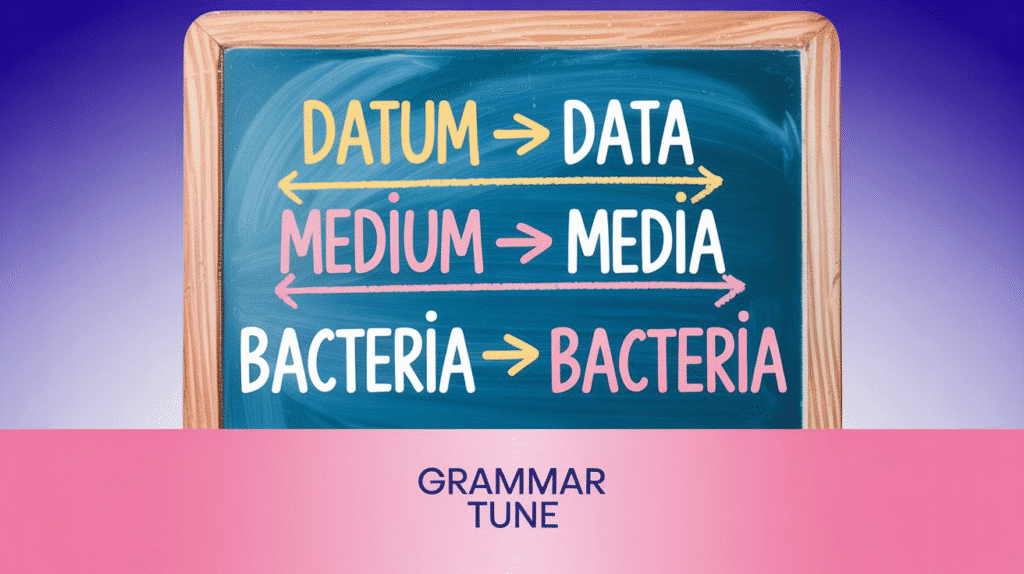The term “bacterium” is very scientific and therefore, it can be very hard for most learners of Academic English to grasp it. A more common term, which is a constant in conversations about health, biology and medicine, is bacteria, and this has already been mentioned a couple of times.
But the question is bigger: What is the correct plural of bacterium? Is “bacteria” the right word to say or “bacteriums” instead? The right answer is not only about grammar, but also about daily communication, and precision in medical and scientific language makes it even more significant, where it is the need for exactness that dictates understanding.
This manual not only defines the terms but also gives clear examples, easy-to-follow rules, and practical applications so that the reader can finally settle the issue.
Singular Form: Bacterium

The word bacterium comes from Latin and refers to a single microscopic organism, usually seen only with the help of a microscope. Scientists use bacterium in the singular whenever they describe one tiny cell that may either cause harm or perform a beneficial role.
In English, this word commonly appears in medical reports, scientific articles, and school textbooks. For example, “This bacterium causes food poisoning.”
Must read: What is the Plural of ‘Stimulus’? Is it ‘Stimuluses’ or ‘Stimuli’ in English Grammar
Plural Form: Bacteria
The plural of bacterium is bacteria, which refers to multiple microorganisms. This follows the pattern of several Latin nouns that English has adopted over time.
For example, doctors often say, “These bacteria spread quickly throughout the human body.” Researchers also use this plural form in medical reports and scientific studies. It’s important to remember that bacteriums is not considered correct in formal English, so bacteria remains the proper form.
Bacteria
The term bacterium describes a tiny living organism that exists in many groups. Some play a positive role, such as helping with digestion, while others are harmful and cause infections.
In the United States, the CDC reports millions of bacterial infection cases each year. This is why clear and accurate grammar is so important in health communication and scientific writing, where precision ensures reliable understanding.
Singular to Plural Transition

English has adopted many words from Latin, and their grammar rules can puzzle learners. For instance, datum becomes data and medium becomes media. In the same way, the plural form of bacterium is bacteria, following the same classical pattern.
This change illustrates how scientific vocabulary preserves its Latin roots while adapting to modern English usage.
Latin Words and Their Plurals
| Singular Form | Plural Form | Field of Use |
| Bacterium | Bacteria | Biology Terms |
| Datum | Data | Statistics / Research |
| Medium | Media | Communication / Arts |
Usage in Sentences
Writers and speakers must recognize when to use the singular and plural forms correctly. The word bacterium applies when referring to a single microorganism.
In contrast, bacteria is used when discussing more than one. Mixing them up can confuse readers or make writing appear careless. Both forms frequently appear in classrooms, research papers, and health-related news.
You will like: Juxtaposition vs Paradox: What’s the Difference?
Singular Usage
Examples of Bacterium in Sentences
- This bacterium causes strep throat.
- A single bacterium was found in the water sample.
- The scientist studied a bacterium under the microscope.
These examples show that bacterium is always singular, referring to just one microscopic organism. This makes it distinct from its plural form, bacteria.
Plural Usage
Examples of Bacteria in Sentences
- These bacteria are resistant to antibiotics.
- The doctor explained how bacteria live in the intestines.
- Harmful bacteria can spread fast through food.
These examples make it clear that bacteria is the plural form of bacterium. It always refers to more than one microorganism, which is why it’s widely used in health, biology, and scientific writing.
Why Not ‘Bacteriums’?

The form bacteriums may sound natural to some learners, but it isn’t accepted in scientific or formal contexts. The only correct plural of bacterium is bacteria.
Just as fungus becomes fungi and protozoon becomes protozoa, English preserves the original Latin endings. While you might hear bacterium’s in casual conversation, it’s not appropriate for academic, medical, or professional writing.
Some Microorganisms and their Plurals
Learning the plurals of other microorganisms helps reveal how scientific words evolve. For instance, fungus → fungi, virus → viruses, alga → algae, and protozoon → protozoa all follow predictable patterns.
Recognizing these forms benefits both grammar learners and students of biology, making scientific language easier to master.
Common Microorganisms and Their Plurals
| Singular | Plural | Example in Sentence |
| Fungus | Fungi | “Mushrooms are a type of fungi.” |
| Virus | Viruses | “Flu is caused by different viruses.” |
| Alga | Algae | “Green algae grow in ponds.” |
| Protozoon | Protozoa | “Some protozoa cause malaria.” |
Case Study: Misuse in Media

In 2018, a major US newspaper mistakenly used bacteriums in a food safety article. The error quickly drew criticism from both scientists and grammar experts.
Readers pointed out that such mistakes reduce credibility and weaken trust in reporting. This highlights why using correct plural forms like bacterium and bacteria is essential, particularly in professional and academic writing.
You will like: Backward or Backwards: Which is Correct?
Expert Tip
Language teachers often emphasize that scientific terminology tends to preserve its original Latin or Greek form. When uncertainty arises, the safest approach is to consult a trusted grammar guide or dictionary.
Applying the correct grammar rules not only prevents errors but also ensures clarity and boosts credibility in both academic and professional writing.
Correct vs Incorrect Forms
| Word Type | Correct Form | Wrong Form |
| Singular | Bacterium | Bacteria (when used as one) |
| Plural | Bacteria | Bacteriums |
| Example | “One bacterium is harmful.” | “One bacteria is harmful.” |
FAQs
What is the plural of bacterium?
The correct plural is bacteria.
Can I say bacteriums in English?
No, formal English does not accept bacteriums.
What is the singular of bacteria?
The singular of bacteria is bacterium.
Do other microorganisms follow this rule?
Yes, like fungus → fungi and alga → algae.
Why do these words follow Latin grammar?
Because English borrowed them from Latin scientific terminology.
Final Thoughts
The debate around What is the Plural of ‘Bacterium’? Is it ‘Bacteria’ or ‘Bacteriums’? often confuses learners. The answer is clear: the correct form is bacteria. Words with Latin roots bring unique patterns into English that learners must understand.
Knowing these grammar tips helps in science, health, and everyday use. From classrooms to research labs, the correct use of bacterium and bacteria keeps language accurate and communication strong.

Joulia, a seasoned wordsmith and grammar enthusiast, brings over a decade of blogging expertise to Grammar Tune. With a keen eye for linguistic precision and a passion for making complex grammar concepts accessible, he has helped thousands of readers enhance their writing skills. His engaging teaching style and practical approach to language learning have made him a trusted voice in the online grammar community.







